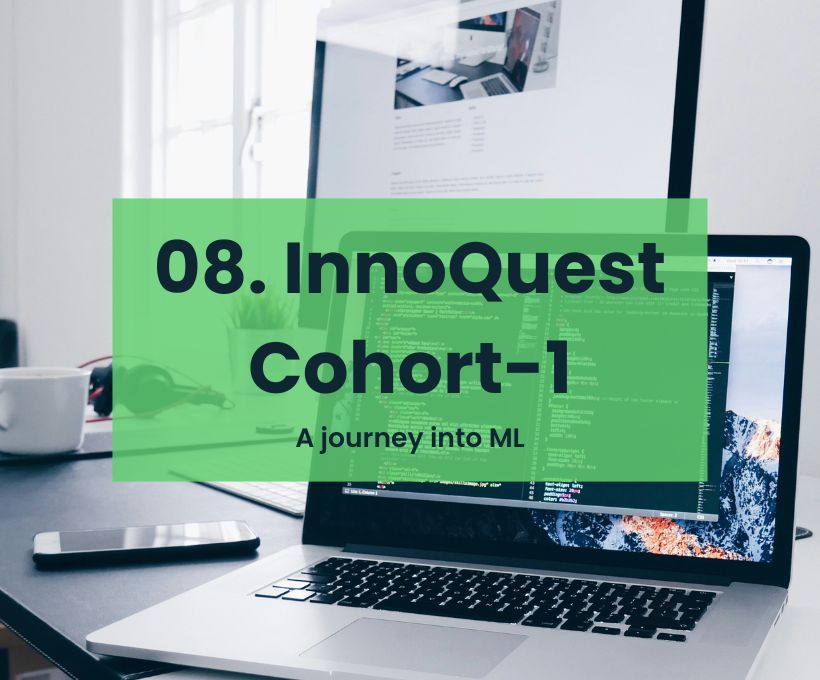Machine Learning (ML) is a field brimming with transformative potential, and experiencing its introduction through Innoquest Cohort-1 Class 8 was a turning point in my learning journey. This class, masterfully conducted by Dr. Ahmed Raza Shahid, combined theoretical rigor with practical understanding, making complex concepts approachable.
An Inspirational Teaching Approach
Dr. Ahmed Raza Shahid’s teaching style was nothing short of phenomenal. His emphasis on explaining the “why” behind processes, such as data standardization, truly resonated with me. By connecting every technique to its real-world implications, he transformed abstract theories into meaningful insights.
Key Topics Covered
1. Introduction to Machine Learning and Its Types
The session began by exploring the fundamentals of Machine Learning (ML) and its three primary types:
- Supervised Learning: Techniques like regression and classification were discussed with practical examples.
- Unsupervised Learning: Covered methods such as clustering and dimensionality reduction.
- Reinforcement Learning: Focused on the concept of delayed rewards and its applications.
2. Dimensionality Reduction
Dimensionality reduction was explained as a crucial step in ML for enhancing model efficiency and interpretability.
- The importance of removing unnecessary features was emphasized using compelling examples.
3. Hyperparameters and Scaling
- Hyperparameters: Defined as parameters that cannot be learned directly from the data but significantly influence model performance.
- Scaling: Dr. Shahid provided an excellent explanation of why scaling data is essential, highlighting how unscaled data can negatively impact model performance and lead to suboptimal results.
4. Vectorization and Tensors
The session offered a concise overview of:
- Vectorization and Tensors: Explained their role in optimizing multi-core processing, enabling faster computations.
5. Advanced Topics
- Multiple Linear Regression and Polynomial Regression: These were explained with clarity, providing a strong understanding of their applications.
- Regularization: Covered as an essential technique for preventing overfitting in ML models.
- Probability and Prediction: Dr. Shahid delivered an outstanding clarification of these concepts, making them easier to understand and apply.
7. Entropy
Entropy was introduced as a measure of uncertainty or disorder in data, forming a foundation for understanding decision trees and information gain in the upcoming lectures.
8. Gradient Descent
The session concluded with an insightful discussion on gradient descent:
- Its role as an optimization algorithm in ML and DL.
- How it helps minimize errors during model training by iteratively adjusting parameters.
A Holistic Learning Experience
What stood out was Dr. Shahid’s knack for illustrating theoretical concepts using the whiteboard, performing calculations, and showcasing demonstrations. Although the session did not involve coding, his solid grasp of ML fundamentals was evident.
For someone with prior ML knowledge, the pace and depth of the class were exhilarating. Multiple concepts I had previously encountered were refreshed, and I gained a deeper understanding of new ones. However, this fast-paced, content-rich training might be challenging for absolute beginners.
A Final Reflection
Innoquest Cohort-1 Class 8 was more than a lecture—it was an intellectual journey through the core principles of Machine Learning. The emphasis on understanding the reasoning behind ML processes was both inspiring and educational.
If you’re looking to refine your ML foundation and learn from a passionate educator like Dr. Ahmed Raza Shahid, this training is a treasure trove of knowledge.
Conclusion
Through this enriching class, I not only enhanced my understanding of ML but also reignited my passion for exploring the depths of this fascinating field. Stay tuned for more updates on my learning journey!
